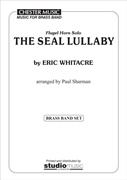We've found 390 matches for your search. Order by
Results
-
 £50.90
£50.90SAVING ALL MY LOVE FOR YOU (Flugel Horn Solo with Brass Band) - Wormald, Christopher
Grade: Easy.
Estimated dispatch 7-14 working days
-
 £42.95
£42.95SEAL LULLABY, The (Flugel Horn Solo with Brass Band) - Whitacre, Eric - Sharman, Paul
This loving and dreamlike work captures the undulating rhythm of a mother rocking her child to sleep. The piece was inspired by classic Rudyard Kipling: "Oh! Hush thee, my baby, the night is behind us, And black are the waters that sparkled so green. The moon, o'er the combers, looks downward to find us, At rest in the hollows that rustle between." Magical!
Estimated dispatch 7-14 working days
-
 £50.90
£50.90SEND IN THE CLOWNS (Flugel Horn Solo with Brass Band) - Sondheim, Stephen - Fernie, Alan
From A Little Night Music. Grade: Easy/Medium.
Estimated dispatch 7-14 working days
-
 £50.90
£50.90SENZA MAMMA (Cornet or Flugel Horn Solo with Brass Band) - Puccini, Giacomo - Parkes, Peter
From Suon Angelica. Grade: Medium.
Estimated dispatch 7-14 working days
-
 £50.90
£50.90SEVENTH HEAVEN (Flugel Horn Solo with Brass Band) - Barry, Darrol
Grade: Easy/Medium.
Estimated dispatch 7-14 working days
-
 £54.20
£54.20SLAVISCHE FANTASIE (Eb Horn Solo with Brass Band) - Hohne, Carl - Kerwin, Simon
Grade: Medium/Difficult.
Estimated dispatch 7-14 working days
-
 £50.90
£50.90SLOVAK WINE-CZARDAS (Flugel Horn or Cornet Solo with Brass Band) - Hudec, Adam
Grade: Medium.
Estimated dispatch 7-14 working days
-
 £50.90
£50.90SOMEONE LIKE YOU (Eb Horn Solo with Brass Band) - Wildhorn, Frank - Rock, Richard
Grade: Medium.
Estimated dispatch 7-14 working days
-
 £54.20
£54.20SONG AND DANCE (Eb Horn Solo with Brass Band) - Woodfield, Ray
Grade: Medium.
Estimated dispatch 7-14 working days
-
 £50.90
£50.90SONG OF THE INDIAN GUESTS (Cornet or Flugel Horn Solo with Brass Band) - Rimsky-Korsakov, Nikolai - Casentieri, Martin
Grade: Easy/Medium.
Estimated dispatch 7-14 working days
